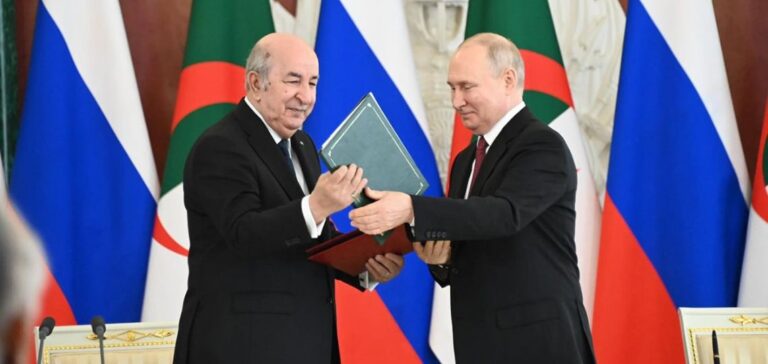Abdelmadjid Tebboune was re-elected President of Algeria with a 95% majority of the vote in the 2024 elections, with a turnout of 48%, up from 39.83% in 2019.
This low turnout, although improved, indicates a persistent disaffection among the electorate and raises questions about the legitimacy of the mandate.
Tebboune is committed to pursuing his hydrocarbon-focused energy strategy, while investing in nuclear and renewable energies.
However, these strategic orientations, while necessary, present economic and geopolitical challenges.
Focus on Hydrocarbons: Advantages and Limitations
Hydrocarbons remain at the heart of Tebboune’s economic strategy, accounting for 95% of Algeria’s foreign currency earnings and around 60% of the national budget.
In 2023, Algeria produced 100 billion cubic meters of natural gas, and plans to reach 110 billion cubic meters by 2025, thanks to massive investment in exploration and production, notably with Sonatrach, the national hydrocarbons company.
Increased exports to Europe, representing around 30% of European natural gas requirements, have benefited from the disruption of energy markets following Russia’s invasion of Ukraine.
However, this dependence on hydrocarbons exposes Algeria to fluctuations in world prices.
The trend towards a decarbonized economy in Europe could also reduce demand in the medium to long term, jeopardizing Algeria’s economic forecasts.
The risk of gas overproduction is very real if global demand does not keep pace with planned capacity increases.
Strategic Partnerships with Russia: Opportunities and Dependence
The energy partnership with Russia has intensified under President Tebboune.
In June 2023, a declaration of “deep strategic partnership” was signed between Tebboune and Vladimir Putin, aimed at strengthening cooperation in the energy sector, particularly nuclear power.
Rosatom, the Russian nuclear giant, signed a memorandum of understanding with Algeria for the development of nuclear research and power reactors, with a joint roadmap for 2024-2025.
These reactors, including third-generation VVER-1200 models, are planned to comply with post-Fukushima standards, guaranteeing a high level of safety.
While these agreements may offer technological and economic advantages in the short term, they also create an increased dependence on Russia.
Given international sanctions and geopolitical tensions, this dependence could limit Algeria’s strategic flexibility and make it vulnerable to regional power dynamics.
Cooperation with Italy and modernization of gas infrastructures
Algeria has also consolidated its relations with Italy, another key player in the energy sector.
In 2024, Sonatrach signed several agreements with ENI for the exploration and production of natural gas.
These agreements include projects to modernize pipelines and develop new fields, with a focus on improving existing infrastructures to secure Europe’s energy supply.
The development of production capacity is designed to meet the immediate needs of the European market, which is in the grip of an energy crisis following the war in Ukraine.
However, the cost of these projects is substantial.
Pipeline modernization and extension, in addition to exploration costs, represent a considerable financial commitment, the returns from which are highly dependent on natural gas market prices and European demand.
Accelerating Solar Investment: An Ambitious Challenge
To diversify its energy mix, Algeria is committed to significantly increasing its renewable energy capacity.
By 2024, Sonelgaz, the state-owned electricity and gas distribution company, has awarded 19 contracts for the construction of 20 solar power plants with a total capacity of 3 GW.
These projects include a 2 GW program for 15 plants and a 1 GW program for a further 5 plants.
By 2035, Algeria is aiming for 15,000 MW of renewable energy capacity, i.e. 37% of its installed capacity and 27% of its national electricity consumption from renewable sources by 2030.
However, despite these ambitious targets, current installed capacity is just 423 MW, revealing a huge gap to be bridged.
Development costs for solar projects are estimated at several billion dollars, requiring massive foreign investment and reforms to attract capital.
Financing remains a major obstacle, as does the need for a stable and transparent regulatory framework.
Objectives for COP 29: Emission Reductions and Financing Opportunities
At COP 29, Algeria reaffirmed its commitment to reducing its greenhouse gas emissions by 7% by 2030 compared with a business-as-usual scenario, with the ambition of reaching 22% with international support in terms of financing and technology transfer.
The plan includes the development of a national framework to attract independent power producers and the promotion of large-scale renewable energy projects.
Achieving these targets will require not only national coordination, but also strong international partnerships for financing and technology sharing.
Critical Analysis: A Sustainable Economic Model?
Tebboune’s re-election and the pursuit of his energy strategy raise several critical questions about Algeria’s economic sustainability.
While hydrocarbons provide a vital economic bedrock, over-reliance on these revenues exposes the country to external shocks and unpredictable market fluctuations.
Moreover, the emphasis on partnership with Russia, while potentially beneficial in the short term, creates long-term risks, especially in times of economic sanctions and geopolitical tensions.
Ambitious renewable energy targets are necessary to diversify Algeria’s energy mix, but they require far-reaching structural reforms and a transparent investment framework to succeed.
Without these changes, the country risks missing the opportunity to benefit from the global energy transition.
Tebboune’s second term will be decisive for Algeria’s energy future.
By maintaining strategic partnerships with Russia and Italy, and investing in renewable energies, Algeria is attempting to navigate between economic stability and adaptation to new global energy realities.
However, for these efforts to be successful, substantial internal reforms and a clear long-term vision will be crucial to avoid the pitfalls of dependency and ensure sustainable growth.





















